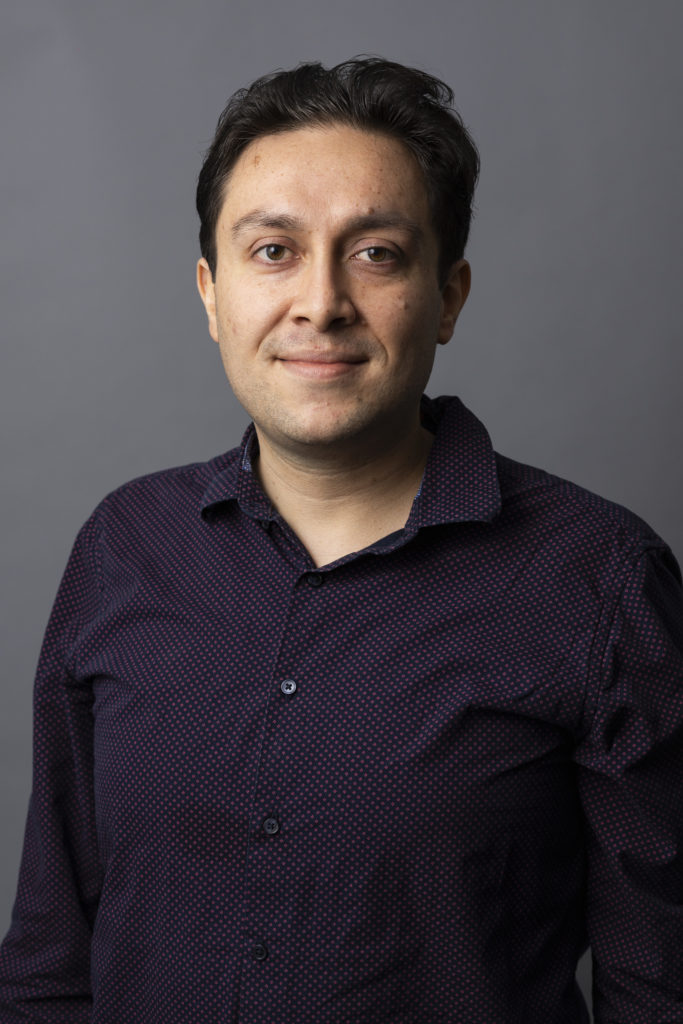
We are delighted to introduce the next contribution to our New Principal Investigators collection.
Read the paper
Fabrication of hydroxylated norbornene foams via frontal polymerization for catalytic applications
Andrew Vogler, Tina Dinh, Hanlin M. Wang, Ghaida Aldhahri, Arfa Abrar Malik and Diego Alzate-Sanchez
Watch the summary
[link to be added]
Meet the Principal Investigator

08/23/23 – BOSTON, MA. – Diego Alzate-Sanchez, College of Science, poses for a headshot in Blackman Auditorium on campus at Northeastern University on Wednesday August 23, 2023. Photo by Adam Glanzman for Northeastern University
Diego was born and raised in Bogotá/Colombia. He completed his undergraduate studies at the National University of Colombia. After graduation, He worked with Professor Cesar Sierra as a Master student in the same institution. Then, He moved to Manizales/Colombia, where he worked as a volcanologist. He moved to the USA and finished his graduate studies at Northwestern University, working with Professor William Dichtel. Then, he completed postdoctoral training at the University of Illinois, Urbana-Champaign in the group of Professor Jeffrey Moore. Currently, Diego is an assistant professor in the department of Chemistry and Chemical Biology at Northeastern University. Diego is an enthusiastic scientist working in polymer sustainability and a member of the DMAS lab, where they are interested in finding alternative techniques to manufacture materials in a more sustainable fashion. They work at the interface of polymer chemistry and materials science, developing cutting edge technologies based on macromolecules.
You’ve recently started your own group, what are the big research question/s your group will be focussing on?
One of the central research questions guiding my new group is: Can we design polymeric materials in a way that mimics nature’s ability to eliminate waste entirely? I’m deeply interested in demonstrating that human systems—particularly those built on synthetic polymers—can achieve true sustainability by embracing circularity. Nature offers a powerful blueprint: everything is reused, repurposed, and regenerated in closed loops. In contrast, many of our synthetic systems rely on linear lifecycles that generate persistent waste.
Our approach to this grand challenge is grounded in polymer chemistry. We focus on developing materials and processes that enable complete circularity—whether through chemical recycling, dynamic covalent networks, bio-based monomers, or systems that degrade predictably under specific conditions. The overarching goal is to prove, through both fundamental and applied work, that it is possible to make polymers that support human needs without compromising planetary health.
What inspired you to get into science?
I’ve always been a curious person, and that curiosity naturally drew me to science. In middle school, I joined a few science clubs where I discovered how much I enjoyed doing experiments and understanding why things happened the way they did. That hands-on experience made science feel both exciting and accessible. In high school, my chemistry teacher recognized that I wasn’t just curious—I was also dedicated and organized. She encouraged me to pursue chemistry, seeing potential in me that I hadn’t fully realized yet. Her support and belief in me played a pivotal role in my decision to become a chemist, and it’s a path I’ve thoroughly enjoyed ever since.
What advice would you give to those who are seeking their first group leader position?
I want to start by acknowledging that everyone’s path is different, and advice that works for one person may not apply to another. That said, one piece of guidance I feel strongly about is: be truthful to yourself. Know what truly excites and motivates you, and try to build your path in that direction. Don’t shape your goals or take on roles just because they seem like the “right” steps toward a group leader position—especially if they don’t align with your interests or values. The energy and authenticity you bring to your work are incredibly important, and they’re only sustainable if you’re doing something you genuinely care about.










